


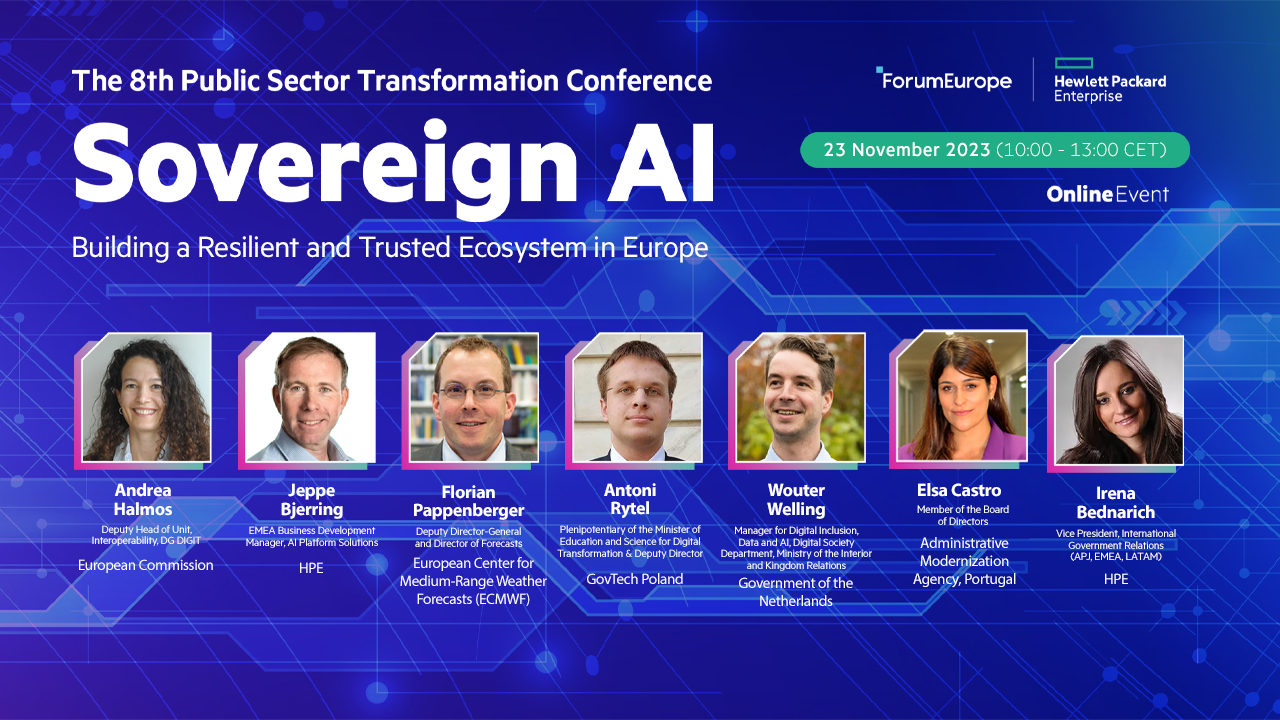

Generative artificial intelligence (AI) has accelerated discussions around the transformative effect that AI will have for governments, businesses and society. The EU has notably embarked on a regulatory path for AI, with the landmark AI Act in its final legislative stages, and the EU-US Trade and Technology Council delivering a joint roadmap to lay the foundations of trustworthy AI on both sides of the Atlantic. These discussions, as well as Member States’ National Plans, have nonetheless centred on data, algorithms and building necessary digital skills to capitalize on the opportunity. Often side-lined from this important conversation, is the immense infrastructure required to develop sovereign AI applications at scale.
The case for AI to transform governments and economies is clear. From improving efficiency by automating routine tasks, to handling citizen queries, improving service delivery through chatbots, and enabling interoperable data spaces to generate novel data-driven policy insights, AI will inevitably produce enormous value for European citizens, businesses, and society at large.
The 8th edition of The Public Sector Transformation Conference will focus on the public sector’s role in addressing the surging demand for increased compute capacity across all sectors and the growing concerns to ensure Europe’s ability to scale and develop sovereign AI systems for the public sector use cases.










Irena Bednarich is the Vice President of International Government Relations APJ, EMEA and LATAM at Hewlett Packard Enterprise. In this role, she leads HPE’s government relations and public policy team in these regions and supports key public sector pursuits across EMEA.
After 14 years in Brussels, Irena has recently relocated to Dubai, UAE, to drive stronger alignment with the business in an important growth region. Irena is fluent in Italian, Slovenian, French, English and German and has working knowledge of Spanish.


Jonas Andrulis has been working with software and intelligent systems since 1998, often close to academic innovation, and has published numerous papers in the research community. After studying industrial engineering at KIT in Karlsruhe and writing a thesis on Bayesian networks, he worked as a consultant in the field of AI and modeling. He successfully founded two AI software companies: The first to plan and optimize logistics, the second to optimize human-in-the-loop training and the validation of deep learning algorithms in human-machine interactions. After three years as Engineering Manager for AI research in Apple’s Special Projects Group in Cupertino and later in AI research at Siri, he founded Aleph Alpha in Heidelberg in 2019, the third AI start-up with a focus on innovation and application of sovereign generalizing artificial intelligence. Since then, Aleph Alpha has raised a total of 500 million euros from some of the best European deep-tech investors and strategic partners with the aim of establishing independent cutting-edge AI research and providing basic technology for a new type of information-based value creation.

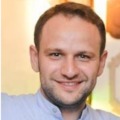
Bio will be available here shortly.

The EU has set its sights on becoming a leading force in integrating AI within the public sector, with the Coordinated Plan on Artificial Intelligence emphasising this goal. AI is a critical pillar of EU competitiveness and is set to revolutionise how data is gathered, stored, and analysed. The potential of European data spaces for novel knowledge creation and public sector decision making is unprecedented. As the digitalisation across public administrations accelerates, attention must continue to be focused on the role sovereign AI can play as a catalyst for interoperable and interconnected data spaces. Cutting across sectors such as health, public administration, finance, environment and energy, interconnected data spaces will facilitate the availability and use of data in European public administrations and throughout society.
The rise of Large Language Models (LLMs) can provide a transformative effect in semantics, predictions, computations and labelling of data – all of which is critical to instrumentalize data spaces and their interconnectivity. Central to Europe’s Data Strategy of achieving a single market for data, interconnectivity among data spaces will facilitate the development of novel AI services trained on larger data sets with high quality and secure data to promote novel AI-powered insights.
This panel discussion will unpack how sovereign AI infrastructures will unlock the potential of interoperable European data spaces in driving new insights on a massive range of industrial and societal issues.
Key Themes: data economy; European data spaces; Interoperability; Sovereign AI for public sector.

Andrea Halmos is a Deputy Head of Unit at the European Commission; helping the digital transformation of public administrations in the EU through interoperability. Her work includes the negotiation and implementation of the recently published Interoperable Europe Act, with particular focus on the role of interoperability on common European data spaces, AI in the public sector, GovTech and the digital transformation of local and regional administrations.
Previously, Andrea has worked for over a decade in the area of digital government. Her main activities included the development and implementation of the eGovernment Action Plan 2016-2020, the promotion of open and modular digital government and supporting the implementation of digital government at local level. During her time in the area of smart cities, she worked on supporting the emergence of AI-enabled Local Digital Twins in the EU.
Prior to joining the European Commission in 2003, she worked for an internet start-up company as a consultant. Having graduated at the Budapest University of Economic Sciences, she received a master’s degree in European studies from the College of Europe and from the Université libre de Bruxelles.


Bio will be available here shortly.


Elsa Castro has been a member of AMA’s Board of Directors since September 1st, 2022.
She holds a law degree from the University of Porto’s Faculty of Law and a master’s degree in public administration from ISCTE – IUL. She also has a postgraduate degree from IADE in Web UX/UI and an Advanced Training course in Service Design from the Faculty of Social and Human Sciences of the Catholic University.
From September 2021 to August 2022, she was a Public Sector Consultant at Deloitte, where she had worked as a Tax Consultant – Global Employer Services – IRS and Social Security, between February and December 2015.
Between June 26th, 2020, and June 15th, 2021, she was Chief of Staff to the Secretary of State for the Budget. Previously, she served as a Technical Advisor at the Permanent Representation of Portugal to the European Union (REPER), in Brussels, for Employment and Social Affairs, from November 2019 to June 2020.
Between December 2015 and October 2019, she was an Assistant in the Office of the Secretary of State for Social Security, acting as head of the office from August 2018 to October 2019.
She worked as a Senior Technician in the Contributions Management Unit of the Benefits and Contributions Department of the Social Security Institute, I. P., between December 2010 and January 2015.


Florian Pappenberger is Deputy Director-General and leads the Forecast Department at the European Centre For Medium-Range Weather Forecasts. The Forecast Department at ECMWF has a strong customer focus. He is responsible for the 24/7 production of weather forecasts, forecast quality control (verification and diagnostics), development of novel forecast products, applications of weather forecasts such as flood, drought, fire and health forecasts, numerical weather prediction relevant software development, data sales and outreach and training. He has led the migration of the operational forecasts to a new HPC centre, the establishment of the European Weather Cloud and is responsible for the Machine Learning activities at ECMWF.
Florian has a background in the forecasting of weather driven natural hazards including floods, droughts, windstorms, forest fires and impacts on human health. He has over 10 years of expertise in operational probabilistic forecasting, extreme value statistics and numerical model system development at ECMWF. Florian is the author of over 250 scientific publications and has won several scientific awards. He is a fellow of the Royal Geographical Society and the Royal Meteorological Society and a member of several other professional bodies including HEPEX, British Hydrological Society, EGU, AGU, EMS, AMS. He served on the editorial board of several international journals and regularly advises on international committees including WMO, WHO and World Bank.


Bio will be available here shortly.


Jeppe Bjerring is at the forefront of driving AI Business Development initiatives for Hewlett Packard Enterprise (HPE) across the expansive regions of Europe, Middle East, and Africa. Boasting over two decades of profound experience within the IT sector, Jeppe is recognized for his pivotal role in assisting clients in harnessing the full potential of their IT investments to achieve optimal business outcomes. Over the years, his expertise has pivoted towards High Performance Computing, with a specific focus on the dynamic realm of Artificial Intelligence.
Jeppe possesses an exceptional talent for demystifying intricate technologies and presenting them in a comprehensible manner. His capacity to distil complex concepts into simple terms is paralleled by his innate ability to evaluate potential business gains for clients. Notably, his collaborations span across diverse industries, with a pronounced presence within the automotive sector. In this capacity, he has been instrumental in the conception and operation of cutting-edge data collection platforms tailored for Advanced Driver Assistance Systems (AD/ADAS) development purposes.
At HPE, Jeppe spearheads the provision of state-of-the-art platforms, empowering clients to seamlessly transition their AI and Machine Learning models into full-scale production environments. His passion for enabling innovation on a grand scale is palpable, as he navigates the intricate landscape of AI technology with unparalleled insight and dedication.


Irena Bednarich is the Vice President of International Government Relations APJ, EMEA and LATAM at Hewlett Packard Enterprise. In this role, she leads HPE’s government relations and public policy team in these regions and supports key public sector pursuits across EMEA.
After 14 years in Brussels, Irena has recently relocated to Dubai, UAE, to drive stronger alignment with the business in an important growth region. Irena is fluent in Italian, Slovenian, French, English and German and has working knowledge of Spanish.

The ICT global market is forecasted to reach a size of EUR 6 trillion this year. The total value added of the EU’s ICT sector was over EUR 600B in 2021, representing 4.9% of EU’s GDP. Despite the essential nature of the ICT industry for the competitiveness of many sectors, the EU share int the global ICT market has fallen from 21.8% in 2013 to 11.3% in 2022. According to Eurostat, in 2022, only 69% of SMEs reached a basic level of digital intensity and 8% of companies used AI technologies. From the regulation of AI to scaling AI, what is required to support and enable companies to integrate AI technologies to optimize their businesses?
With 2 of the top 5 fastest supercomputers in the June 2023 Top500, EuroHPC JU has positioned Europe as a leader in delivering high-end compute capacity. However, with different types of workloads required specifically for AI, we must ensure that resources invested in HPC systems across Europe can benefit European businesses striving to scale their innovations in AI. How are Member States National Strategies aligned with the compute capacity needed to enable the rapid uptake of AI? What is the blueprint at European level? This panel will focus on EU-wide, National and industry-led approaches to enable European businesses to access necessary compute resources and scale AI systems to create a thriving AI ecosystem, focused on innovation, research and talent, in Europe.
Key themes: national AI strategies; EuroHPC JU, EU Competitiveness, AI at scale, democratizing compute capacity.

DG Communications Networks, Content and Technology, European Commission, Acting Director of DG Connect C “Digital Excellence and Science Infrastructure” and Head of Unit of the High Performance Computing and Quantum Technology unit
Dr. Gustav Kalbe studied Applied Physics at the Université Catholique de Louvain, Belgium. In 1991 he studied Applied Optics at the Imperial College of Science in London. In 1995 he completed his studies and earned a PhD in Physics at the Université Catholique de Louvain, Belgium.
He started his professional career as a project manager in photonic networks at the incumbent telecom operator in Belgium. He was R&D manager when he left the company.
In 1998 he joined the Directorate General Information Society & Media of the European Commission where he started working as Project Officer managing research projects of the European Framework Programs for Research. Over the years he had several assignments in quantum technologies, photonics, and cybersecurity.
In 2014 Gustav Kalbe became Head of Unit for Administration & Finance in the European Commission, in Directorate General Communications Networks, Content and Technology.
In 2016 he was appointed Head of Unit of the newly created High Performance Computingand Quantum Technology unit in Directorate General Communications Networks, Content and Technology.
In 2018 he became responsible for the establishment and operation of the European High Performance Computing Joint Undertaking. He occupied the post of Interim Executive Director of the Joint Undertaking until its autonomy by the end of 2020.
In January 2021, he was appointed Deputy to the Director of DG Connect C “Digital Excellence and Science Infrastructure”.
Since May 2022 Gustav is the Acting Director of DG Connect C “Digital Excellence and Science Infrastructure”.


As Secretary General, Declan Hughes advises Government and leads the Department and its offices and agencies in promoting the creation of high-quality and sustainable full employment; by championing enterprise, supporting, and incentivising a competitive and innovative research and enterprise base, negotiating international trade agreements, and promoting fair and competitive employment and markets.
Declan has served as a Board member of IDA Ireland, SFI and Enterprise Ireland. He was also a member of National Competitiveness Council, the Interim Public Procurement Reform Board and Food Wise Implementation Committee and Chair of the Disruptive Technologies Innovation Fund Committee. He has served on EU and OECD committees.
Declan joined the Department in 2014 as Assistant Secretary, heading the Strategic Policy Division and subsequently had responsibility for policy development and funding programmes for Inward investment and Enterprise Innovation and for Indigenous Enterprise, SMEs, and Entrepreneurship Divisions. He was formerly on the Executive Committee of the enterprise, trade and science and technology advisory agency, Forfás. He has led a range of national and regional policy and funding initiatives, including on ecommerce, enterprise and trade strategies, skills and research prioritisation, regional enterprise plans, the Action Plan for Jobs and Brexit and COVID business supports.
Declan is a Bachelor of Commerce graduate and holds a Masters and Postgraduate Diploma from the Smurfit Graduate School of Business, UCD. He has completed executive programmes at Wharton School of Business, Roffey Park Institute and Singapore Civil Service College. He is a member of Institute of Directors.


Salvador Estevan Martínez holds a degree in Telecommunications Engineering from the Polytechnic University of Valencia and in 2010, he joined the Senior Corps of Systems and Information Technologies of the State Administration by competitive examination. In 2015, he completed the IESE Business School Public Management Leadership Programme.
Since September 2021, he is General Director of Digitalisation and Artificial Intelligence. He is responsible for the study, proposal and execution of the overall policy and strategic planning, action and regulation towards Artificial Intelligence. As well as for digital enabling technologies, digital services and intermediaries, cybersecurity, talent, skills and digital entrepreneurship. He is in charge of the development and promotion of plans, programmes, projects and actions for the massive use of digital services and data in the digital transformation society and economy.
Previously, he was Deputy Director General for Planning and Governance of the Digital Administration of the General Secretariat for Digital Administration. He was in charge of the management, definition, development and deployment of the digital transformation strategy, and e-Government international affairs. He also coordinated the ICT collegiate bodies.
Salvador E. Martinez holds an extensive experience in team coordination, budget, and high-impact projects management. During 2021, he has actively participated in the definition of the projects included in the Recovery, Transformation and Resilience Plan, the actions for the Digital Spain 2025 Agenda, as strategic for the Directorate General´s mission and vision.


Öster has previously worked in managerial and directorial positions at the KTH Royal Institute of Technology in Stockholm, in consultant and specialist positions at Volvo Data AB, and as a researcher at the Chalmers University of Technology and University of Gothenburg.
Key concurrent positions of trust: EUDAT Ltd Chair of Board of directors, ELIXIR Board member, EOSC AISBL General Assembly member and NORDUnet A/S board deputy member.


Bio will be available here shortly.


Irena Bednarich is the Vice President of International Government Relations APJ, EMEA and LATAM at Hewlett Packard Enterprise. In this role, she leads HPE’s government relations and public policy team in these regions and supports key public sector pursuits across EMEA.
After 14 years in Brussels, Irena has recently relocated to Dubai, UAE, to drive stronger alignment with the business in an important growth region. Irena is fluent in Italian, Slovenian, French, English and German and has working knowledge of Spanish.


Irena Bednarich is the Vice President of International Government Relations APJ, EMEA and LATAM at Hewlett Packard Enterprise. In this role, she leads HPE’s government relations and public policy team in these regions and supports key public sector pursuits across EMEA.
After 14 years in Brussels, Irena has recently relocated to Dubai, UAE, to drive stronger alignment with the business in an important growth region. Irena is fluent in Italian, Slovenian, French, English and German and has working knowledge of Spanish.


Irena Bednarich is the Vice President of International Government Relations APJ, EMEA and LATAM at Hewlett Packard Enterprise. In this role, she leads HPE’s government relations and public policy team in these regions and supports key public sector pursuits across EMEA.
After 14 years in Brussels, Irena has recently relocated to Dubai, UAE, to drive stronger alignment with the business in an important growth region. Irena is fluent in Italian, Slovenian, French, English and German and has working knowledge of Spanish.


Jonas Andrulis has been working with software and intelligent systems since 1998, often close to academic innovation, and has published numerous papers in the research community. After studying industrial engineering at KIT in Karlsruhe and writing a thesis on Bayesian networks, he worked as a consultant in the field of AI and modeling. He successfully founded two AI software companies: The first to plan and optimize logistics, the second to optimize human-in-the-loop training and the validation of deep learning algorithms in human-machine interactions. After three years as Engineering Manager for AI research in Apple’s Special Projects Group in Cupertino and later in AI research at Siri, he founded Aleph Alpha in Heidelberg in 2019, the third AI start-up with a focus on innovation and application of sovereign generalizing artificial intelligence. Since then, Aleph Alpha has raised a total of 500 million euros from some of the best European deep-tech investors and strategic partners with the aim of establishing independent cutting-edge AI research and providing basic technology for a new type of information-based value creation.


Bio will be available here shortly.

The EU has set its sights on becoming a leading force in integrating AI within the public sector, with the Coordinated Plan on Artificial Intelligence emphasising this goal. AI is a critical pillar of EU competitiveness and is set to revolutionise how data is gathered, stored, and analysed. The potential of European data spaces for novel knowledge creation and public sector decision making is unprecedented. As the digitalisation across public administrations accelerates, attention must continue to be focused on the role sovereign AI can play as a catalyst for interoperable and interconnected data spaces. Cutting across sectors such as health, public administration, finance, environment and energy, interconnected data spaces will facilitate the availability and use of data in European public administrations and throughout society.
The rise of Large Language Models (LLMs) can provide a transformative effect in semantics, predictions, computations and labelling of data – all of which is critical to instrumentalize data spaces and their interconnectivity. Central to Europe’s Data Strategy of achieving a single market for data, interconnectivity among data spaces will facilitate the development of novel AI services trained on larger data sets with high quality and secure data to promote novel AI-powered insights.
This panel discussion will unpack how sovereign AI infrastructures will unlock the potential of interoperable European data spaces in driving new insights on a massive range of industrial and societal issues.
Key Themes: data economy; European data spaces; Interoperability; Sovereign AI for public sector.

Andrea Halmos is a Deputy Head of Unit at the European Commission; helping the digital transformation of public administrations in the EU through interoperability. Her work includes the negotiation and implementation of the recently published Interoperable Europe Act, with particular focus on the role of interoperability on common European data spaces, AI in the public sector, GovTech and the digital transformation of local and regional administrations.
Previously, Andrea has worked for over a decade in the area of digital government. Her main activities included the development and implementation of the eGovernment Action Plan 2016-2020, the promotion of open and modular digital government and supporting the implementation of digital government at local level. During her time in the area of smart cities, she worked on supporting the emergence of AI-enabled Local Digital Twins in the EU.
Prior to joining the European Commission in 2003, she worked for an internet start-up company as a consultant. Having graduated at the Budapest University of Economic Sciences, she received a master’s degree in European studies from the College of Europe and from the Université libre de Bruxelles.


Bio will be available here shortly.


Elsa Castro has been a member of AMA’s Board of Directors since September 1st, 2022.
She holds a law degree from the University of Porto’s Faculty of Law and a master’s degree in public administration from ISCTE – IUL. She also has a postgraduate degree from IADE in Web UX/UI and an Advanced Training course in Service Design from the Faculty of Social and Human Sciences of the Catholic University.
From September 2021 to August 2022, she was a Public Sector Consultant at Deloitte, where she had worked as a Tax Consultant – Global Employer Services – IRS and Social Security, between February and December 2015.
Between June 26th, 2020, and June 15th, 2021, she was Chief of Staff to the Secretary of State for the Budget. Previously, she served as a Technical Advisor at the Permanent Representation of Portugal to the European Union (REPER), in Brussels, for Employment and Social Affairs, from November 2019 to June 2020.
Between December 2015 and October 2019, she was an Assistant in the Office of the Secretary of State for Social Security, acting as head of the office from August 2018 to October 2019.
She worked as a Senior Technician in the Contributions Management Unit of the Benefits and Contributions Department of the Social Security Institute, I. P., between December 2010 and January 2015.


Florian Pappenberger is Deputy Director-General and leads the Forecast Department at the European Centre For Medium-Range Weather Forecasts. The Forecast Department at ECMWF has a strong customer focus. He is responsible for the 24/7 production of weather forecasts, forecast quality control (verification and diagnostics), development of novel forecast products, applications of weather forecasts such as flood, drought, fire and health forecasts, numerical weather prediction relevant software development, data sales and outreach and training. He has led the migration of the operational forecasts to a new HPC centre, the establishment of the European Weather Cloud and is responsible for the Machine Learning activities at ECMWF.
Florian has a background in the forecasting of weather driven natural hazards including floods, droughts, windstorms, forest fires and impacts on human health. He has over 10 years of expertise in operational probabilistic forecasting, extreme value statistics and numerical model system development at ECMWF. Florian is the author of over 250 scientific publications and has won several scientific awards. He is a fellow of the Royal Geographical Society and the Royal Meteorological Society and a member of several other professional bodies including HEPEX, British Hydrological Society, EGU, AGU, EMS, AMS. He served on the editorial board of several international journals and regularly advises on international committees including WMO, WHO and World Bank.


Bio will be available here shortly.


Jeppe Bjerring is at the forefront of driving AI Business Development initiatives for Hewlett Packard Enterprise (HPE) across the expansive regions of Europe, Middle East, and Africa. Boasting over two decades of profound experience within the IT sector, Jeppe is recognized for his pivotal role in assisting clients in harnessing the full potential of their IT investments to achieve optimal business outcomes. Over the years, his expertise has pivoted towards High Performance Computing, with a specific focus on the dynamic realm of Artificial Intelligence.
Jeppe possesses an exceptional talent for demystifying intricate technologies and presenting them in a comprehensible manner. His capacity to distil complex concepts into simple terms is paralleled by his innate ability to evaluate potential business gains for clients. Notably, his collaborations span across diverse industries, with a pronounced presence within the automotive sector. In this capacity, he has been instrumental in the conception and operation of cutting-edge data collection platforms tailored for Advanced Driver Assistance Systems (AD/ADAS) development purposes.
At HPE, Jeppe spearheads the provision of state-of-the-art platforms, empowering clients to seamlessly transition their AI and Machine Learning models into full-scale production environments. His passion for enabling innovation on a grand scale is palpable, as he navigates the intricate landscape of AI technology with unparalleled insight and dedication.


Irena Bednarich is the Vice President of International Government Relations APJ, EMEA and LATAM at Hewlett Packard Enterprise. In this role, she leads HPE’s government relations and public policy team in these regions and supports key public sector pursuits across EMEA.
After 14 years in Brussels, Irena has recently relocated to Dubai, UAE, to drive stronger alignment with the business in an important growth region. Irena is fluent in Italian, Slovenian, French, English and German and has working knowledge of Spanish.

The ICT global market is forecasted to reach a size of EUR 6 trillion this year. The total value added of the EU’s ICT sector was over EUR 600B in 2021, representing 4.9% of EU’s GDP. Despite the essential nature of the ICT industry for the competitiveness of many sectors, the EU share int the global ICT market has fallen from 21.8% in 2013 to 11.3% in 2022. According to Eurostat, in 2022, only 69% of SMEs reached a basic level of digital intensity and 8% of companies used AI technologies. From the regulation of AI to scaling AI, what is required to support and enable companies to integrate AI technologies to optimize their businesses?
With 2 of the top 5 fastest supercomputers in the June 2023 Top500, EuroHPC JU has positioned Europe as a leader in delivering high-end compute capacity. However, with different types of workloads required specifically for AI, we must ensure that resources invested in HPC systems across Europe can benefit European businesses striving to scale their innovations in AI. How are Member States National Strategies aligned with the compute capacity needed to enable the rapid uptake of AI? What is the blueprint at European level? This panel will focus on EU-wide, National and industry-led approaches to enable European businesses to access necessary compute resources and scale AI systems to create a thriving AI ecosystem, focused on innovation, research and talent, in Europe.
Key themes: national AI strategies; EuroHPC JU, EU Competitiveness, AI at scale, democratizing compute capacity.

DG Communications Networks, Content and Technology, European Commission, Acting Director of DG Connect C “Digital Excellence and Science Infrastructure” and Head of Unit of the High Performance Computing and Quantum Technology unit
Dr. Gustav Kalbe studied Applied Physics at the Université Catholique de Louvain, Belgium. In 1991 he studied Applied Optics at the Imperial College of Science in London. In 1995 he completed his studies and earned a PhD in Physics at the Université Catholique de Louvain, Belgium.
He started his professional career as a project manager in photonic networks at the incumbent telecom operator in Belgium. He was R&D manager when he left the company.
In 1998 he joined the Directorate General Information Society & Media of the European Commission where he started working as Project Officer managing research projects of the European Framework Programs for Research. Over the years he had several assignments in quantum technologies, photonics, and cybersecurity.
In 2014 Gustav Kalbe became Head of Unit for Administration & Finance in the European Commission, in Directorate General Communications Networks, Content and Technology.
In 2016 he was appointed Head of Unit of the newly created High Performance Computingand Quantum Technology unit in Directorate General Communications Networks, Content and Technology.
In 2018 he became responsible for the establishment and operation of the European High Performance Computing Joint Undertaking. He occupied the post of Interim Executive Director of the Joint Undertaking until its autonomy by the end of 2020.
In January 2021, he was appointed Deputy to the Director of DG Connect C “Digital Excellence and Science Infrastructure”.
Since May 2022 Gustav is the Acting Director of DG Connect C “Digital Excellence and Science Infrastructure”.


As Secretary General, Declan Hughes advises Government and leads the Department and its offices and agencies in promoting the creation of high-quality and sustainable full employment; by championing enterprise, supporting, and incentivising a competitive and innovative research and enterprise base, negotiating international trade agreements, and promoting fair and competitive employment and markets.
Declan has served as a Board member of IDA Ireland, SFI and Enterprise Ireland. He was also a member of National Competitiveness Council, the Interim Public Procurement Reform Board and Food Wise Implementation Committee and Chair of the Disruptive Technologies Innovation Fund Committee. He has served on EU and OECD committees.
Declan joined the Department in 2014 as Assistant Secretary, heading the Strategic Policy Division and subsequently had responsibility for policy development and funding programmes for Inward investment and Enterprise Innovation and for Indigenous Enterprise, SMEs, and Entrepreneurship Divisions. He was formerly on the Executive Committee of the enterprise, trade and science and technology advisory agency, Forfás. He has led a range of national and regional policy and funding initiatives, including on ecommerce, enterprise and trade strategies, skills and research prioritisation, regional enterprise plans, the Action Plan for Jobs and Brexit and COVID business supports.
Declan is a Bachelor of Commerce graduate and holds a Masters and Postgraduate Diploma from the Smurfit Graduate School of Business, UCD. He has completed executive programmes at Wharton School of Business, Roffey Park Institute and Singapore Civil Service College. He is a member of Institute of Directors.


Salvador Estevan Martínez holds a degree in Telecommunications Engineering from the Polytechnic University of Valencia and in 2010, he joined the Senior Corps of Systems and Information Technologies of the State Administration by competitive examination. In 2015, he completed the IESE Business School Public Management Leadership Programme.
Since September 2021, he is General Director of Digitalisation and Artificial Intelligence. He is responsible for the study, proposal and execution of the overall policy and strategic planning, action and regulation towards Artificial Intelligence. As well as for digital enabling technologies, digital services and intermediaries, cybersecurity, talent, skills and digital entrepreneurship. He is in charge of the development and promotion of plans, programmes, projects and actions for the massive use of digital services and data in the digital transformation society and economy.
Previously, he was Deputy Director General for Planning and Governance of the Digital Administration of the General Secretariat for Digital Administration. He was in charge of the management, definition, development and deployment of the digital transformation strategy, and e-Government international affairs. He also coordinated the ICT collegiate bodies.
Salvador E. Martinez holds an extensive experience in team coordination, budget, and high-impact projects management. During 2021, he has actively participated in the definition of the projects included in the Recovery, Transformation and Resilience Plan, the actions for the Digital Spain 2025 Agenda, as strategic for the Directorate General´s mission and vision.


Öster has previously worked in managerial and directorial positions at the KTH Royal Institute of Technology in Stockholm, in consultant and specialist positions at Volvo Data AB, and as a researcher at the Chalmers University of Technology and University of Gothenburg.
Key concurrent positions of trust: EUDAT Ltd Chair of Board of directors, ELIXIR Board member, EOSC AISBL General Assembly member and NORDUnet A/S board deputy member.


Bio will be available here shortly.


Irena Bednarich is the Vice President of International Government Relations APJ, EMEA and LATAM at Hewlett Packard Enterprise. In this role, she leads HPE’s government relations and public policy team in these regions and supports key public sector pursuits across EMEA.
After 14 years in Brussels, Irena has recently relocated to Dubai, UAE, to drive stronger alignment with the business in an important growth region. Irena is fluent in Italian, Slovenian, French, English and German and has working knowledge of Spanish.


Irena Bednarich is the Vice President of International Government Relations APJ, EMEA and LATAM at Hewlett Packard Enterprise. In this role, she leads HPE’s government relations and public policy team in these regions and supports key public sector pursuits across EMEA.
After 14 years in Brussels, Irena has recently relocated to Dubai, UAE, to drive stronger alignment with the business in an important growth region. Irena is fluent in Italian, Slovenian, French, English and German and has working knowledge of Spanish.

More speakers will be announced in the coming days. Please return here for regular updates.

 Jonas Andrulis, Founder & CEO, Aleph Alpha
Jonas Andrulis, Founder & CEO, Aleph Alpha Jonas Andrulis has been working with software and intelligent systems since 1998, often close to academic innovation, and has published numerous papers in the research community. After studying industrial engineering at KIT in Karlsruhe and writing a thesis on Bayesian networks, he worked as a consultant in the field of AI and modeling. He successfully founded two AI software companies: The first to plan and optimize logistics, the second to optimize human-in-the-loop training and the validation of deep learning algorithms in human-machine interactions. After three years as Engineering Manager for AI research in Apple’s Special Projects Group in Cupertino and later in AI research at Siri, he founded Aleph Alpha in Heidelberg in 2019, the third AI start-up with a focus on innovation and application of sovereign generalizing artificial intelligence. Since then, Aleph Alpha has raised a total of 500 million euros from some of the best European deep-tech investors and strategic partners with the aim of establishing independent cutting-edge AI research and providing basic technology for a new type of information-based value creation.

 Andrea Halmos, Deputy Head of Unit, Interoperability, DG DIGIT, European Commission
Andrea Halmos, Deputy Head of Unit, Interoperability, DG DIGIT, European Commission Andrea Halmos is a Deputy Head of Unit at the European Commission; helping the digital transformation of public administrations in the EU through interoperability. Her work includes the negotiation and implementation of the recently published Interoperable Europe Act, with particular focus on the role of interoperability on common European data spaces, AI in the public sector, GovTech and the digital transformation of local and regional administrations.
Previously, Andrea has worked for over a decade in the area of digital government. Her main activities included the development and implementation of the eGovernment Action Plan 2016-2020, the promotion of open and modular digital government and supporting the implementation of digital government at local level. During her time in the area of smart cities, she worked on supporting the emergence of AI-enabled Local Digital Twins in the EU.
Prior to joining the European Commission in 2003, she worked for an internet start-up company as a consultant. Having graduated at the Budapest University of Economic Sciences, she received a master’s degree in European studies from the College of Europe and from the Université libre de Bruxelles.
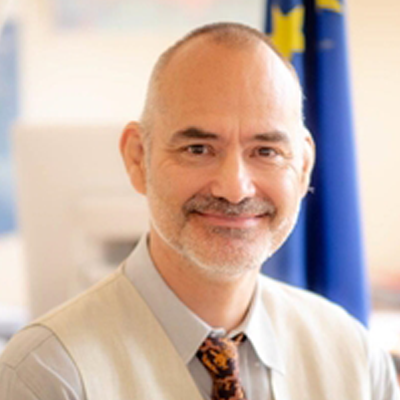
 Gustav Kalbe, Acting Director, Digital Excellence & Science Infrastructure, DG CNECT, European Commission
Gustav Kalbe, Acting Director, Digital Excellence & Science Infrastructure, DG CNECT, European Commission DG Communications Networks, Content and Technology, European Commission, Acting Director of DG Connect C “Digital Excellence and Science Infrastructure” and Head of Unit of the High Performance Computing and Quantum Technology unit
Dr. Gustav Kalbe studied Applied Physics at the Université Catholique de Louvain, Belgium. In 1991 he studied Applied Optics at the Imperial College of Science in London. In 1995 he completed his studies and earned a PhD in Physics at the Université Catholique de Louvain, Belgium.
He started his professional career as a project manager in photonic networks at the incumbent telecom operator in Belgium. He was R&D manager when he left the company.
In 1998 he joined the Directorate General Information Society & Media of the European Commission where he started working as Project Officer managing research projects of the European Framework Programs for Research. Over the years he had several assignments in quantum technologies, photonics, and cybersecurity.
In 2014 Gustav Kalbe became Head of Unit for Administration & Finance in the European Commission, in Directorate General Communications Networks, Content and Technology.
In 2016 he was appointed Head of Unit of the newly created High Performance Computingand Quantum Technology unit in Directorate General Communications Networks, Content and Technology.
In 2018 he became responsible for the establishment and operation of the European High Performance Computing Joint Undertaking. He occupied the post of Interim Executive Director of the Joint Undertaking until its autonomy by the end of 2020.
In January 2021, he was appointed Deputy to the Director of DG Connect C “Digital Excellence and Science Infrastructure”.
Since May 2022 Gustav is the Acting Director of DG Connect C “Digital Excellence and Science Infrastructure”.

 Declan Hughes, Secretary General, Department of Enterprise, Trade and Employment, Government of Ireland
Declan Hughes, Secretary General, Department of Enterprise, Trade and Employment, Government of Ireland As Secretary General, Declan Hughes advises Government and leads the Department and its offices and agencies in promoting the creation of high-quality and sustainable full employment; by championing enterprise, supporting, and incentivising a competitive and innovative research and enterprise base, negotiating international trade agreements, and promoting fair and competitive employment and markets.
Declan has served as a Board member of IDA Ireland, SFI and Enterprise Ireland. He was also a member of National Competitiveness Council, the Interim Public Procurement Reform Board and Food Wise Implementation Committee and Chair of the Disruptive Technologies Innovation Fund Committee. He has served on EU and OECD committees.
Declan joined the Department in 2014 as Assistant Secretary, heading the Strategic Policy Division and subsequently had responsibility for policy development and funding programmes for Inward investment and Enterprise Innovation and for Indigenous Enterprise, SMEs, and Entrepreneurship Divisions. He was formerly on the Executive Committee of the enterprise, trade and science and technology advisory agency, Forfás. He has led a range of national and regional policy and funding initiatives, including on ecommerce, enterprise and trade strategies, skills and research prioritisation, regional enterprise plans, the Action Plan for Jobs and Brexit and COVID business supports.
Declan is a Bachelor of Commerce graduate and holds a Masters and Postgraduate Diploma from the Smurfit Graduate School of Business, UCD. He has completed executive programmes at Wharton School of Business, Roffey Park Institute and Singapore Civil Service College. He is a member of Institute of Directors.
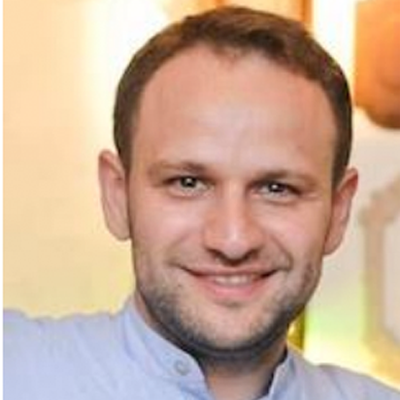
 Sorin Cheran, Fellow, Vice President and Global CTO of Data and AI, HPE
Sorin Cheran, Fellow, Vice President and Global CTO of Data and AI, HPE Bio will be available here shortly.
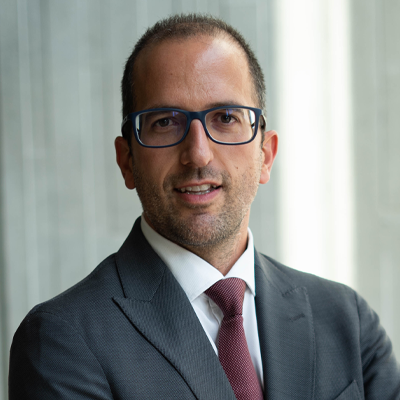
 Salvador Estevan Martínez, Director General of Digitalisation and Artificial Intelligence, Ministry of Economic Affairs and Digital Transformation, Government of Spain
Salvador Estevan Martínez, Director General of Digitalisation and Artificial Intelligence, Ministry of Economic Affairs and Digital Transformation, Government of Spain Salvador Estevan Martínez holds a degree in Telecommunications Engineering from the Polytechnic University of Valencia and in 2010, he joined the Senior Corps of Systems and Information Technologies of the State Administration by competitive examination. In 2015, he completed the IESE Business School Public Management Leadership Programme.
Since September 2021, he is General Director of Digitalisation and Artificial Intelligence. He is responsible for the study, proposal and execution of the overall policy and strategic planning, action and regulation towards Artificial Intelligence. As well as for digital enabling technologies, digital services and intermediaries, cybersecurity, talent, skills and digital entrepreneurship. He is in charge of the development and promotion of plans, programmes, projects and actions for the massive use of digital services and data in the digital transformation society and economy.
Previously, he was Deputy Director General for Planning and Governance of the Digital Administration of the General Secretariat for Digital Administration. He was in charge of the management, definition, development and deployment of the digital transformation strategy, and e-Government international affairs. He also coordinated the ICT collegiate bodies.
Salvador E. Martinez holds an extensive experience in team coordination, budget, and high-impact projects management. During 2021, he has actively participated in the definition of the projects included in the Recovery, Transformation and Resilience Plan, the actions for the Digital Spain 2025 Agenda, as strategic for the Directorate General´s mission and vision.

 Elsa Castro, Member of the Board of Directors, Administrative Modernization Agency, Portugal
Elsa Castro, Member of the Board of Directors, Administrative Modernization Agency, Portugal Elsa Castro has been a member of AMA’s Board of Directors since September 1st, 2022.
She holds a law degree from the University of Porto’s Faculty of Law and a master’s degree in public administration from ISCTE – IUL. She also has a postgraduate degree from IADE in Web UX/UI and an Advanced Training course in Service Design from the Faculty of Social and Human Sciences of the Catholic University.
From September 2021 to August 2022, she was a Public Sector Consultant at Deloitte, where she had worked as a Tax Consultant – Global Employer Services – IRS and Social Security, between February and December 2015.
Between June 26th, 2020, and June 15th, 2021, she was Chief of Staff to the Secretary of State for the Budget. Previously, she served as a Technical Advisor at the Permanent Representation of Portugal to the European Union (REPER), in Brussels, for Employment and Social Affairs, from November 2019 to June 2020.
Between December 2015 and October 2019, she was an Assistant in the Office of the Secretary of State for Social Security, acting as head of the office from August 2018 to October 2019.
She worked as a Senior Technician in the Contributions Management Unit of the Benefits and Contributions Department of the Social Security Institute, I. P., between December 2010 and January 2015.

 Florian Pappenberger, Deputy Director-General and Director of Forecasts, European Center for Medium-Range Weather Forecasts (ECMWF)
Florian Pappenberger, Deputy Director-General and Director of Forecasts, European Center for Medium-Range Weather Forecasts (ECMWF) Florian Pappenberger is Deputy Director-General and leads the Forecast Department at the European Centre For Medium-Range Weather Forecasts. The Forecast Department at ECMWF has a strong customer focus. He is responsible for the 24/7 production of weather forecasts, forecast quality control (verification and diagnostics), development of novel forecast products, applications of weather forecasts such as flood, drought, fire and health forecasts, numerical weather prediction relevant software development, data sales and outreach and training. He has led the migration of the operational forecasts to a new HPC centre, the establishment of the European Weather Cloud and is responsible for the Machine Learning activities at ECMWF.
Florian has a background in the forecasting of weather driven natural hazards including floods, droughts, windstorms, forest fires and impacts on human health. He has over 10 years of expertise in operational probabilistic forecasting, extreme value statistics and numerical model system development at ECMWF. Florian is the author of over 250 scientific publications and has won several scientific awards. He is a fellow of the Royal Geographical Society and the Royal Meteorological Society and a member of several other professional bodies including HEPEX, British Hydrological Society, EGU, AGU, EMS, AMS. He served on the editorial board of several international journals and regularly advises on international committees including WMO, WHO and World Bank.

 Jeroen Bjerring, EMEA Business Development Manager, AI Platform Solutions, HPE
Jeroen Bjerring, EMEA Business Development Manager, AI Platform Solutions, HPE Jeppe Bjerring is at the forefront of driving AI Business Development initiatives for Hewlett Packard Enterprise (HPE) across the expansive regions of Europe, Middle East, and Africa. Boasting over two decades of profound experience within the IT sector, Jeppe is recognized for his pivotal role in assisting clients in harnessing the full potential of their IT investments to achieve optimal business outcomes. Over the years, his expertise has pivoted towards High Performance Computing, with a specific focus on the dynamic realm of Artificial Intelligence.
Jeppe possesses an exceptional talent for demystifying intricate technologies and presenting them in a comprehensible manner. His capacity to distil complex concepts into simple terms is paralleled by his innate ability to evaluate potential business gains for clients. Notably, his collaborations span across diverse industries, with a pronounced presence within the automotive sector. In this capacity, he has been instrumental in the conception and operation of cutting-edge data collection platforms tailored for Advanced Driver Assistance Systems (AD/ADAS) development purposes.
At HPE, Jeppe spearheads the provision of state-of-the-art platforms, empowering clients to seamlessly transition their AI and Machine Learning models into full-scale production environments. His passion for enabling innovation on a grand scale is palpable, as he navigates the intricate landscape of AI technology with unparalleled insight and dedication.

 Per Öster, Director, Advanced Computing Facility, CSC - IT Center for Science
Per Öster, Director, Advanced Computing Facility, CSC - IT Center for Science Öster has previously worked in managerial and directorial positions at the KTH Royal Institute of Technology in Stockholm, in consultant and specialist positions at Volvo Data AB, and as a researcher at the Chalmers University of Technology and University of Gothenburg.
Key concurrent positions of trust: EUDAT Ltd Chair of Board of directors, ELIXIR Board member, EOSC AISBL General Assembly member and NORDUnet A/S board deputy member.

 Iveta Lohovska, Chief Technologist, AI, Data and Supercomputing, HPE
Iveta Lohovska, Chief Technologist, AI, Data and Supercomputing, HPE Bio will be available here shortly.
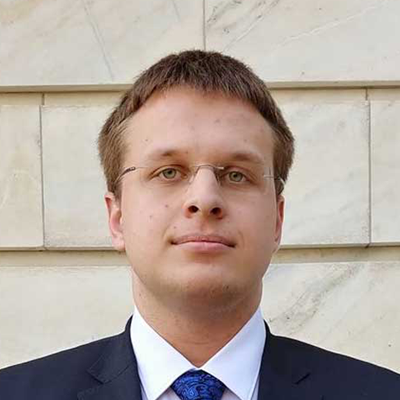
 Antoni Rytel, Plenipotentiary of the Minister of Education and Science for Digital Transformation, Deputy Director of GovTech Poland, Republic of Poland
Antoni Rytel, Plenipotentiary of the Minister of Education and Science for Digital Transformation, Deputy Director of GovTech Poland, Republic of Poland Bio will be available here shortly.

 Wouter Welling, Manager for Digital Inclusion, Data and AI, Digital Society Department, Ministry of the Interior and Kingdom Relations, Government of the Netherlands
Wouter Welling, Manager for Digital Inclusion, Data and AI, Digital Society Department, Ministry of the Interior and Kingdom Relations, Government of the Netherlands Bio will appear here shortly.
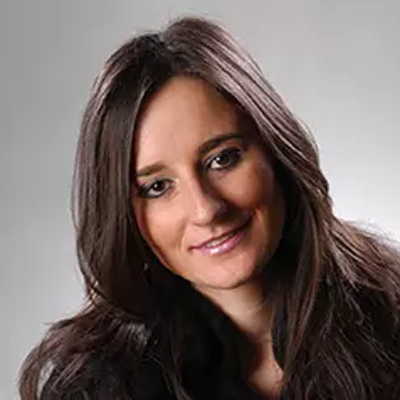
 Irena Bednarich, Vice President, International Government Relations (APJ, EMEA, LATAM), HPE
Irena Bednarich, Vice President, International Government Relations (APJ, EMEA, LATAM), HPE Irena Bednarich is the Vice President of International Government Relations APJ, EMEA and LATAM at Hewlett Packard Enterprise. In this role, she leads HPE’s government relations and public policy team in these regions and supports key public sector pursuits across EMEA.
After 14 years in Brussels, Irena has recently relocated to Dubai, UAE, to drive stronger alignment with the business in an important growth region. Irena is fluent in Italian, Slovenian, French, English and German and has working knowledge of Spanish.

 Jonas Andrulis, Founder & CEO, Aleph Alpha
Jonas Andrulis, Founder & CEO, Aleph Alpha Jonas Andrulis has been working with software and intelligent systems since 1998, often close to academic innovation, and has published numerous papers in the research community. After studying industrial engineering at KIT in Karlsruhe and writing a thesis on Bayesian networks, he worked as a consultant in the field of AI and modeling. He successfully founded two AI software companies: The first to plan and optimize logistics, the second to optimize human-in-the-loop training and the validation of deep learning algorithms in human-machine interactions. After three years as Engineering Manager for AI research in Apple’s Special Projects Group in Cupertino and later in AI research at Siri, he founded Aleph Alpha in Heidelberg in 2019, the third AI start-up with a focus on innovation and application of sovereign generalizing artificial intelligence. Since then, Aleph Alpha has raised a total of 500 million euros from some of the best European deep-tech investors and strategic partners with the aim of establishing independent cutting-edge AI research and providing basic technology for a new type of information-based value creation.

 Andrea Halmos, Deputy Head of Unit, Interoperability, DG DIGIT, European Commission
Andrea Halmos, Deputy Head of Unit, Interoperability, DG DIGIT, European Commission Andrea Halmos is a Deputy Head of Unit at the European Commission; helping the digital transformation of public administrations in the EU through interoperability. Her work includes the negotiation and implementation of the recently published Interoperable Europe Act, with particular focus on the role of interoperability on common European data spaces, AI in the public sector, GovTech and the digital transformation of local and regional administrations.
Previously, Andrea has worked for over a decade in the area of digital government. Her main activities included the development and implementation of the eGovernment Action Plan 2016-2020, the promotion of open and modular digital government and supporting the implementation of digital government at local level. During her time in the area of smart cities, she worked on supporting the emergence of AI-enabled Local Digital Twins in the EU.
Prior to joining the European Commission in 2003, she worked for an internet start-up company as a consultant. Having graduated at the Budapest University of Economic Sciences, she received a master’s degree in European studies from the College of Europe and from the Université libre de Bruxelles.

 Gustav Kalbe, Acting Director, Digital Excellence & Science Infrastructure, DG CNECT, European Commission
Gustav Kalbe, Acting Director, Digital Excellence & Science Infrastructure, DG CNECT, European Commission DG Communications Networks, Content and Technology, European Commission, Acting Director of DG Connect C “Digital Excellence and Science Infrastructure” and Head of Unit of the High Performance Computing and Quantum Technology unit
Dr. Gustav Kalbe studied Applied Physics at the Université Catholique de Louvain, Belgium. In 1991 he studied Applied Optics at the Imperial College of Science in London. In 1995 he completed his studies and earned a PhD in Physics at the Université Catholique de Louvain, Belgium.
He started his professional career as a project manager in photonic networks at the incumbent telecom operator in Belgium. He was R&D manager when he left the company.
In 1998 he joined the Directorate General Information Society & Media of the European Commission where he started working as Project Officer managing research projects of the European Framework Programs for Research. Over the years he had several assignments in quantum technologies, photonics, and cybersecurity.
In 2014 Gustav Kalbe became Head of Unit for Administration & Finance in the European Commission, in Directorate General Communications Networks, Content and Technology.
In 2016 he was appointed Head of Unit of the newly created High Performance Computingand Quantum Technology unit in Directorate General Communications Networks, Content and Technology.
In 2018 he became responsible for the establishment and operation of the European High Performance Computing Joint Undertaking. He occupied the post of Interim Executive Director of the Joint Undertaking until its autonomy by the end of 2020.
In January 2021, he was appointed Deputy to the Director of DG Connect C “Digital Excellence and Science Infrastructure”.
Since May 2022 Gustav is the Acting Director of DG Connect C “Digital Excellence and Science Infrastructure”.

 Declan Hughes, Secretary General, Department of Enterprise, Trade and Employment, Government of Ireland
Declan Hughes, Secretary General, Department of Enterprise, Trade and Employment, Government of Ireland As Secretary General, Declan Hughes advises Government and leads the Department and its offices and agencies in promoting the creation of high-quality and sustainable full employment; by championing enterprise, supporting, and incentivising a competitive and innovative research and enterprise base, negotiating international trade agreements, and promoting fair and competitive employment and markets.
Declan has served as a Board member of IDA Ireland, SFI and Enterprise Ireland. He was also a member of National Competitiveness Council, the Interim Public Procurement Reform Board and Food Wise Implementation Committee and Chair of the Disruptive Technologies Innovation Fund Committee. He has served on EU and OECD committees.
Declan joined the Department in 2014 as Assistant Secretary, heading the Strategic Policy Division and subsequently had responsibility for policy development and funding programmes for Inward investment and Enterprise Innovation and for Indigenous Enterprise, SMEs, and Entrepreneurship Divisions. He was formerly on the Executive Committee of the enterprise, trade and science and technology advisory agency, Forfás. He has led a range of national and regional policy and funding initiatives, including on ecommerce, enterprise and trade strategies, skills and research prioritisation, regional enterprise plans, the Action Plan for Jobs and Brexit and COVID business supports.
Declan is a Bachelor of Commerce graduate and holds a Masters and Postgraduate Diploma from the Smurfit Graduate School of Business, UCD. He has completed executive programmes at Wharton School of Business, Roffey Park Institute and Singapore Civil Service College. He is a member of Institute of Directors.

 Sorin Cheran, Fellow, Vice President and Global CTO of Data and AI, HPE
Sorin Cheran, Fellow, Vice President and Global CTO of Data and AI, HPE Bio will be available here shortly.

 Salvador Estevan Martínez, Director General of Digitalisation and Artificial Intelligence, Ministry of Economic Affairs and Digital Transformation, Government of Spain
Salvador Estevan Martínez, Director General of Digitalisation and Artificial Intelligence, Ministry of Economic Affairs and Digital Transformation, Government of Spain Salvador Estevan Martínez holds a degree in Telecommunications Engineering from the Polytechnic University of Valencia and in 2010, he joined the Senior Corps of Systems and Information Technologies of the State Administration by competitive examination. In 2015, he completed the IESE Business School Public Management Leadership Programme.
Since September 2021, he is General Director of Digitalisation and Artificial Intelligence. He is responsible for the study, proposal and execution of the overall policy and strategic planning, action and regulation towards Artificial Intelligence. As well as for digital enabling technologies, digital services and intermediaries, cybersecurity, talent, skills and digital entrepreneurship. He is in charge of the development and promotion of plans, programmes, projects and actions for the massive use of digital services and data in the digital transformation society and economy.
Previously, he was Deputy Director General for Planning and Governance of the Digital Administration of the General Secretariat for Digital Administration. He was in charge of the management, definition, development and deployment of the digital transformation strategy, and e-Government international affairs. He also coordinated the ICT collegiate bodies.
Salvador E. Martinez holds an extensive experience in team coordination, budget, and high-impact projects management. During 2021, he has actively participated in the definition of the projects included in the Recovery, Transformation and Resilience Plan, the actions for the Digital Spain 2025 Agenda, as strategic for the Directorate General´s mission and vision.

 Elsa Castro, Member of the Board of Directors, Administrative Modernization Agency, Portugal
Elsa Castro, Member of the Board of Directors, Administrative Modernization Agency, Portugal Elsa Castro has been a member of AMA’s Board of Directors since September 1st, 2022.
She holds a law degree from the University of Porto’s Faculty of Law and a master’s degree in public administration from ISCTE – IUL. She also has a postgraduate degree from IADE in Web UX/UI and an Advanced Training course in Service Design from the Faculty of Social and Human Sciences of the Catholic University.
From September 2021 to August 2022, she was a Public Sector Consultant at Deloitte, where she had worked as a Tax Consultant – Global Employer Services – IRS and Social Security, between February and December 2015.
Between June 26th, 2020, and June 15th, 2021, she was Chief of Staff to the Secretary of State for the Budget. Previously, she served as a Technical Advisor at the Permanent Representation of Portugal to the European Union (REPER), in Brussels, for Employment and Social Affairs, from November 2019 to June 2020.
Between December 2015 and October 2019, she was an Assistant in the Office of the Secretary of State for Social Security, acting as head of the office from August 2018 to October 2019.
She worked as a Senior Technician in the Contributions Management Unit of the Benefits and Contributions Department of the Social Security Institute, I. P., between December 2010 and January 2015.

 Florian Pappenberger, Deputy Director-General and Director of Forecasts, European Center for Medium-Range Weather Forecasts (ECMWF)
Florian Pappenberger, Deputy Director-General and Director of Forecasts, European Center for Medium-Range Weather Forecasts (ECMWF) Florian Pappenberger is Deputy Director-General and leads the Forecast Department at the European Centre For Medium-Range Weather Forecasts. The Forecast Department at ECMWF has a strong customer focus. He is responsible for the 24/7 production of weather forecasts, forecast quality control (verification and diagnostics), development of novel forecast products, applications of weather forecasts such as flood, drought, fire and health forecasts, numerical weather prediction relevant software development, data sales and outreach and training. He has led the migration of the operational forecasts to a new HPC centre, the establishment of the European Weather Cloud and is responsible for the Machine Learning activities at ECMWF.
Florian has a background in the forecasting of weather driven natural hazards including floods, droughts, windstorms, forest fires and impacts on human health. He has over 10 years of expertise in operational probabilistic forecasting, extreme value statistics and numerical model system development at ECMWF. Florian is the author of over 250 scientific publications and has won several scientific awards. He is a fellow of the Royal Geographical Society and the Royal Meteorological Society and a member of several other professional bodies including HEPEX, British Hydrological Society, EGU, AGU, EMS, AMS. He served on the editorial board of several international journals and regularly advises on international committees including WMO, WHO and World Bank.

 Jeroen Bjerring, EMEA Business Development Manager, AI Platform Solutions, HPE
Jeroen Bjerring, EMEA Business Development Manager, AI Platform Solutions, HPE Jeppe Bjerring is at the forefront of driving AI Business Development initiatives for Hewlett Packard Enterprise (HPE) across the expansive regions of Europe, Middle East, and Africa. Boasting over two decades of profound experience within the IT sector, Jeppe is recognized for his pivotal role in assisting clients in harnessing the full potential of their IT investments to achieve optimal business outcomes. Over the years, his expertise has pivoted towards High Performance Computing, with a specific focus on the dynamic realm of Artificial Intelligence.
Jeppe possesses an exceptional talent for demystifying intricate technologies and presenting them in a comprehensible manner. His capacity to distil complex concepts into simple terms is paralleled by his innate ability to evaluate potential business gains for clients. Notably, his collaborations span across diverse industries, with a pronounced presence within the automotive sector. In this capacity, he has been instrumental in the conception and operation of cutting-edge data collection platforms tailored for Advanced Driver Assistance Systems (AD/ADAS) development purposes.
At HPE, Jeppe spearheads the provision of state-of-the-art platforms, empowering clients to seamlessly transition their AI and Machine Learning models into full-scale production environments. His passion for enabling innovation on a grand scale is palpable, as he navigates the intricate landscape of AI technology with unparalleled insight and dedication.

 Per Öster, Director, Advanced Computing Facility, CSC - IT Center for Science
Per Öster, Director, Advanced Computing Facility, CSC - IT Center for Science Öster has previously worked in managerial and directorial positions at the KTH Royal Institute of Technology in Stockholm, in consultant and specialist positions at Volvo Data AB, and as a researcher at the Chalmers University of Technology and University of Gothenburg.
Key concurrent positions of trust: EUDAT Ltd Chair of Board of directors, ELIXIR Board member, EOSC AISBL General Assembly member and NORDUnet A/S board deputy member.

 Iveta Lohovska, Chief Technologist, AI, Data and Supercomputing, HPE
Iveta Lohovska, Chief Technologist, AI, Data and Supercomputing, HPE Bio will be available here shortly.

 Antoni Rytel, Plenipotentiary of the Minister of Education and Science for Digital Transformation, Deputy Director of GovTech Poland, Republic of Poland
Antoni Rytel, Plenipotentiary of the Minister of Education and Science for Digital Transformation, Deputy Director of GovTech Poland, Republic of Poland Bio will be available here shortly.

 Wouter Welling, Manager for Digital Inclusion, Data and AI, Digital Society Department, Ministry of the Interior and Kingdom Relations, Government of the Netherlands
Wouter Welling, Manager for Digital Inclusion, Data and AI, Digital Society Department, Ministry of the Interior and Kingdom Relations, Government of the Netherlands Bio will appear here shortly.

 Irena Bednarich, Vice President, International Government Relations (APJ, EMEA, LATAM), HPE
Irena Bednarich, Vice President, International Government Relations (APJ, EMEA, LATAM), HPE Irena Bednarich is the Vice President of International Government Relations APJ, EMEA and LATAM at Hewlett Packard Enterprise. In this role, she leads HPE’s government relations and public policy team in these regions and supports key public sector pursuits across EMEA.
After 14 years in Brussels, Irena has recently relocated to Dubai, UAE, to drive stronger alignment with the business in an important growth region. Irena is fluent in Italian, Slovenian, French, English and German and has working knowledge of Spanish.

 Forum Europe
Forum Europe Forum Europe | OFCORES has been providing 360° event solutions since 1989. We are specialists in virtual, hybrid and in-person events for corporate and institutional clients in Brussels and all-around Europe. Our expert team develops conference and event programmes with impact and provides first-class event logistics. We see it as our mission to cover every angle of our clients’ projects to make event planning as easy as possible, so that our clients can focus on the issues that matter most: creating meaningful connections, fostering dialogue, and unlocking opportunities.

 Hewlett Packard Enterprise (HPE)
Hewlett Packard Enterprise (HPE) HPE is the global edge-to-cloud company built to transform your business. How? By helping you connect, protect, analyze, and act on all your data and applications wherever they live, from edge to cloud, so you can turn insights into outcomes at the speed required to thrive in today’s complex world.
For more information on any aspect of this event, please contact the team.
Lorena Rodriguez
Senior Event Manager
Forum Europe | OFCORES
Join the conversation #EUSovereignAI
© Copyright FOGES NV. All rights reserved | Privacy Policy | Terms and Conditions | Cookies Policy | Booking Terms and Conditions | Registered in Belgium | Registered Office: Route de Lennik 451, 1070 Brussels, Belgium | Tel: +44 (0) 2920 783 020 | Email: team@fe-ofc.com